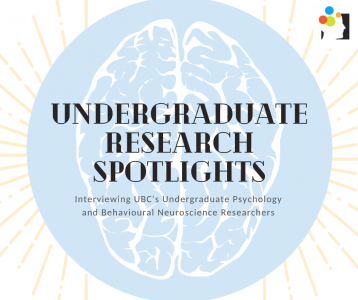4th Year Behavioural Neuroscience, Honours
By: Akshara Rajeshkannan, Muthaira Abid, Christine Seo

A = Could you start off by giving us a brief introduction, starting with your name, what year you’re in, where you’re from and your preferred pronouns.
J = Sure! My name is Josh, my preferred pronouns are he/him. I’m in my 4th year and I’m from Calgary.
A = And if you could just give us 1 fun fact about yourself
J = Before university, I took a year off and tried my luck at becoming a rockstar. I joined a band and played shows for a while – I sang and played the guitar.
A = That’s awesome, that’s so cool!
C = You have to perform for us one day!
A = Yes for sure! Now let’s move on to some questions.
M = Could you give us a short overview of what your research project is about and what you did?
J = I don’t have a research project this year, but last year I was working with this species called Caenorhabditis elegans*, which is a tiny nematode worm. I was trying to see if stimulating nociceptors* to induce pain in different developmental stages would create changes in habituation* in adulthood, producing a phenotype* for learning and memory changes in pain induced worms. In the lab, we stimulated the worm’s receptors using a method called optogenetics* when they were younger and then tested them when they were adults.
So, during the testing phase, we shone light on the genetically altered pain receptors to excite the pain neurons. We knew that we were stimulating the pain receptors and actually inducing pain by the worms’ reaction of running away when light was shone on them, as well as from information we had from the lab that we ordered the strains from. We wanted to see if stimulating the pain receptors would impact habituation in the worms, and we tested for this by tapping them on the dish over and over again. Normally, when you tap on the worms, they tend to retreat backward, but after repeated tapping, they eventually stop responding to that stimulus.
*Caenorhabditis elegans (“C. elegans”) = free-living, non-parasitic transparent worms, about 1 mm in length. Many genes in the C. elegans genome have counterparts in humans, which makes them great for modeling a number of human diseases.
*Nociceptors = sensory pain receptors
*Habituation = when there is a decrease in response to a stimulus after frequent repetition over time
*Phenotype = observable physical properties of an organism
*Optogenetics = a neuroscience technique where genes for light-sensitive proteins are introduced into certain types of brain cells––in this case, pain receptors–– in order to monitor and control their activity using light signals
M = That’s very cool, what sparked your interest? Did anyone inspire you?
J = In my first year I took PSYC 101, and my professor ended up becoming my supervisor. She would tell us all about her research with worms. Plus, I’ve always been interested in molecular biology, and psychology as well. I thought this lab was cool because it combined the two, particularly in showing how molecular biology can affect things like sensation, and learning and memory, and all these psychological concepts that we learn about in class.
M = What has been your favorite part of the process?
J = Definitely working with the worms! I know it sounds weird but picking up little worms from a microscope and looking at them move around was cool!
C = Can you share anything about the results that you found? Any trends you observed?
J = The results weren’t super statistically significant (the likelihood that a relationship between two or more variables is caused by something other than chance) and our p-values (values that help determine significance of results) were very stringent, but we found that there may be an effect from nociceptor stimulation on habituation in the last stages of development. However, the results were not very conclusive as many of the plates of C. elegans I was using got contaminated with bacteria. The bacteria reached all the way down to their guts, which meant the next 3 generations of the worms were all contaminated as well. This affected the results––so I had large error bars. But, it was definitely a part of my learning process.
C = What was your most surprising observation from your study?
J = My most surprising observation would be the fact that stimulating the pain receptors of the younger worms didn’t affect their habituation in adulthood. You would think that stimulating nociceptors to induce pain during development would have some long-lasting impacts. But there may have been a confound (extraneous variable), in that the younger worms may not have been fully expressing enough of the light-affected ion channels needed for the technique we were using to stimulate the pain receptors. So, I guess what really surprised me was how much there is to keep track of when you’re conducting an experiment. You can’t really account for everything when you plan out procedures, and once you complete the experiments, you realize that there were many other factors that should have been accounted for.
C = Interesting, it’s so cool that you got to try out optogenetics, that’s not something you get to do in class.
J = I think the most eye opening part of being in the lab was that there is just so much knowledge out there. Being in the lab meetings made me realise that I was just scratching the surface of what is known. When you’re in university, you feel like everything new is earth shattering news. But you’re barely scratching the surface of what’s out there.
C = Have you had the chance to compare your results with existing literature?
J = I have been able to compare my discussion with some other research that has dealt with the same nociceptor, but for the most part this idea is pretty new. So I couldn’t find a lot to compare it against. The PI (principle investigator) sort of gave this to me as a pilot project to see if there is anything worth looking at.
C = What will you be doing with your research now that it is completed?
J = I used the data and results for my honours thesis. I also submitted it to the psychology section of the Global Undergraduate Awards in Ireland, which receives about 2000 entries per year across multiple categories, of which 10% get published in the undergraduate journal. I don’t expect to win anything, but I thought it would be worth the try because you never know. I was also supposed to present my poster at the Psychology Undergraduate Research Conference earlier this year, but it was cancelled due to COVID-19. I’m still part of the same lab, and will be returning once COVID-19 restrictions are lifted. Right now my research career is sort of up in the air.
A = I just wanted to ask about the future of your research. How do you see the results of your study being applied to the real world?
J = Good question. It’s about worms after all, and you’d think––what can a worm tell us about anything? The C. elegans genome has been fully sequenced (even before the human genome) as a pilot for the human genome project. Their neural connectivity has also been fully mapped. This makes the species a good model organism to gain insight into how biology might work in more complicated organisms. My project specifically might not have a huge impact, but if someone takes this research forward, they might be able to gain some insight into how our environment can interact with our biology to impact our behaviour.
A = If you could do your study again what would you do differently and why?
J = I would definitely be more……clean. I’m not sure how the plates got contaminated, but after they did, it became really hard to conduct the research. I would have also given myself more than 8 months to conduct more replications and collect more data points, but since it was a thesis project, I wasn’t able to.
A = When did your project end?
J = I had to have my thesis finished in April 2020, so I started practicing the skills needed for it in August 2019.
A = Since you were talking about getting prepared for your lab, What courses were most helpful in gaining background knowledge about your research?
J = Definitely all the science heavy courses, but also psychology courses. Any knowledge you can get is useful because there is so much to know. It’s nice to have a background in a bunch of disciplines to feed off of. Even taking random classes about things you never thought would be useful can help you think about things differently.
M = What do you see yourself doing in 10 years?
J = My dream right now is to be a neurosurgeon, that would be the pinnacle of my success. I realized this when I decided to go back to university after my gap year and realized how much I missed learning science. I really like that it combines the things I like––like how the brain works––with helping people.
A = On the topic of your personal growth, how has being in the honours program helped you grow personally and professionally?
J = The honours program helped me grow because it forced me to get out of my comfort zone by reaching out to research labs and professors. I also gained more confidence by speaking up and sharing my unique ideas as an undergraduate student, even in a room full of professors and grad students. I was told that by being an undergraduate student, I was bringing in a fresh perspective. I realized that research is a different type of learning from classroom learning because being in the lab exposed me to so much new knowledge. That’s when I understood that I was just scratching the surface of what was known in the world.
I think it would be important to mention right now that I’m not in the honours program anymore. After spending 8 months carrying out this research as an honours student, I decided to pursue a normal degree because of the limited hands-on research opportunities due to the COVID-19 situation. However, I’m still working with the same lab.
M = What were the most challenging and rewarding parts of being in the honours program? How did you manage your time and prioritise?
J = Judging by my lateness to this meeting, my organisational skills are not always amazing but they are definitely better than before. Being a part of the honours program meant that I had to be well organized and get into the habit of planning for things in advance. The most rewarding part of it at the end was reflecting on all the things I achieved and seeing how my organisational skills have improved over time. I used a calendar to stay organized––this changed my life. If I didn’t put something down in the calendar, it wouldn’t happen. In terms of prioritizing, I always tried to listen to myself and do what felt right in the moment, especially with taking breaks and recharging. This worked for me….as long as I didn’t get too lazy!
The most rewarding part of the honours program is looking back on it when you’re done and realising how much you accomplished, all while having so much fun. I’m grateful for the opportunities and people I’ve been able to meet. It’s important to start creating a network for yourself and get in the loop, because opportunities really do produce more opportunities.
